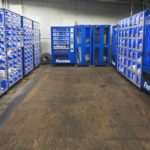If a distributor is in the throes of transforming its outside salespeople into internal sales executives, Justin Roff-Marsh, the founder of Ballistix, has some frank advice for you: Don’t bother.
Speaking at MDM’s first Sales GPS Roundtable of the year, Roff-Marsh used the examples of asking a welder or brain surgeon to perform functions other than welding or brain surgery as the reasons why it’s not a good idea to move outside sales staff to internal sales positions.
“We don’t transform people. We’re builders,” said Roff-Marsh, who is a sales management and marketing consultant. “All we’re suggesting is that we create an environment for a salesperson to operate using the same set of rules as we would for a brain surgeon. Let’s build an environment where the salesperson performs that one skill that’s most representative of their special ability, and nothing else. The challenge isn’t with the people at all. The challenge is building that environment in the first place.”
“It has become apparent to all observers that things in sales are not the way we thought they were for the last 20 years. The traditional image of a salesperson that’s held by most senior executives is this swashbuckling, field-based, entrepreneurial individual out there hunting for new business. That is the exact opposite of what sales has become.”
In regard to moving outside sales inside, Roff-Marsh said that would be like using old lumber for a home remodeling project. While Roff-Marsh’s customers largely keep their staff, they don’t turn legacy field salespeople into internal sales executives.
“That that would be crazy in the extreme,” he said. “What we try and do is grow the organization fast enough so that you have some flexibility when it comes to finding new roles for those people if you need them in the organization, if you need their experience and if you need their expertise.”
According to Roff-Marsh, there needs to be new definitions for salespeople. In reality, sales has nothing to do with revenue. While the maintenance of revenue and incremental growth are critical, neither should be the responsibility of sales.
“It (revenue) should be the responsibility of operations,” he said. “Its operations that has their hand on the lever. If you’re an account manager wandering around in the field talking to existing accounts, you’re now part of operations. You never should have been part of sales.
“Now that we’ve cleared the deck, it becomes fairly plain that what sales should be responsible for is winning new business. And of course, the value of winning new business is not the revenue. The value of winning new businesses is the net present value of the annuity that each new piece of business represents.”
Pandemic underscores that sales model is broken
Even prior to the pandemic, Roff-Marsh said outside salespeople were rarely in the field hunting for new business. Most of their time is now spent using a phone to perform account management, “which is a fancy word for customer service,” he said.
“What has actually happened is the pandemic has laid bare the true reality of sales, which, in most industrial environment, is salespeople who are mobile, or partly mobile, highly paid customer service reps,” he said. “And that’s not to criticize salespeople, but the environment that we’ve built for them to operate within conspires to make it impossible for them to be anything but a partly mobile, overpaid customer service rep, and COVID has exposed this reality for all to see.”
“If you’re serious about growing sales, it’s almost impossible to have a meaningful impact on sales by working within the sales function. In most organizations, sales is actually constrained by the functions that are adjacent to sales. So most of the work that we do in order to grow sales aggressively in organizations is with the customer service team.”
Once a customer recognizes that sales should not be responsible for revenue, then job titles and metrics can be re-aligned, Roff-Marsh said.
“The obvious end state is that we want salespeople — we want the sales function, including marketing — to be relentlessly hunting for new annuities, new business, and then chucking them over the fence for operations to look after,” he said.
Marsh-Roff said when he works with a customer, he spends 70% to 80% of his time re-engineering the customer service team and the marketing team to create an environment where a customer has a small number of professional salespeople “who do an extraordinarily high volume of selling conversations, and do absolutely nothing else.” All of which leads to the demise of the generalist sales functions.
“If you create an environment where salespeople come in in the morning, plug in a headset, log into the CRM, and spend all day having selling conversations against opportunities that are provided to them by the marketing team and go home and come back the next day and repeat, you will make money,” he said. “The sales transformation piece is incredibly easy once you build that environment. The difficult part is building the environment in the first place.”
Related Posts
-
Despite the dip in overall sales for Fastenal, the company reported daily sales were up…
-
Fastenal’s reported daily sales for the month were also up 6.8% versus a year ago…
-
3M reports that sales increased 2% in the Americas and EMEA (Europe, Middle East and…





